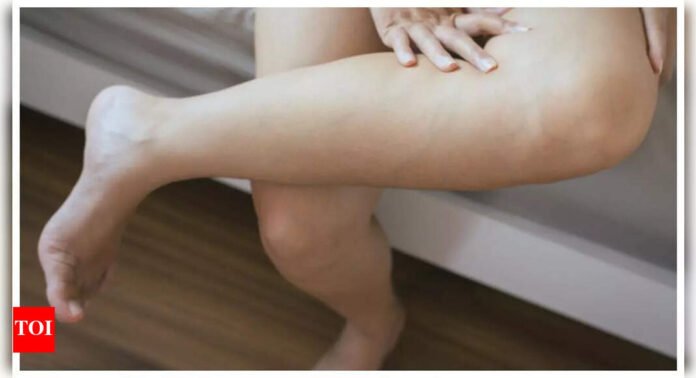6 Hidden Health Issues Your Legs Might Show
Our bodies often send us signals when something isn’t right. It’s crucial to pay attention to these signs and get help early. Our legs, which support our entire body, can show various symptoms that might indicate hidden health problems. Don’t ignore pain, cramps, tingling, swelling, or visible veins in your legs. These could be signs of underlying issues that need attention.
Pain in Your Feet
Foot pain, especially in the lower part, can have many causes. These include:
- Injuries
- Arthritis
- Poor blood flow
Sometimes, foot pain can also indicate deficiencies in:
- Vitamin D
- B vitamins
These vitamins are essential for strong bones and healthy nerves. For example, not having enough vitamin D can make your bones weak and cause joint pain. Poor blood flow, often due to narrowed blood vessels, can also lead to foot pain. This might be linked to heart or blood vessel problems.
Leg Cramps
Muscle cramps in your calves or thighs are common. But they can be more than just a sign of tired muscles. A lack of carnitine, a nutrient that helps your muscles produce energy, can cause leg cramps. These cramps often happen at night.
Carnitine helps your muscles relax after they contract. Without enough carnitine, your muscles can stay contracted, causing painful cramps. Other mineral deficiencies that can trigger cramps include:
- Magnesium
- Potassium
- Calcium
Dehydration or overexertion can also cause cramps. These usually go away on their own.
Tingling in Your Feet
A tingling sensation, often described as “pins and needles,” is usually related to nerve problems. One common cause is a lack of vitamin B12, which is crucial for nerve health. Without enough B12, your nerves can get damaged, causing:
- Numbness
- Tingling
- Burning sensations
Other causes of tingling include:
- Diabetes
- Poor blood flow
- Pinched nerves from spinal issues
- Autoimmune diseases
- Infections
Joint Pain
Joint pain is often linked to arthritis or injury. But it can also be caused by a lack of vitamin D. Vitamin D helps keep your bones and joints healthy by regulating calcium absorption. Low levels of vitamin D can lead to soft bones and worsen arthritis symptoms. Getting enough vitamin D can help relieve this condition.
Swollen Feet
Swollen feet and ankles happen when fluid builds up in the tissues. This is called edema. Water retention can be caused by:
- Standing for long periods
- Eating too much salt
- Pregnancy
- Injury
- Dehydration
However, persistent swelling might indicate more serious issues like:
- Heart failure
- Kidney disease
- Liver disease
When blood pools in the leg veins, fluid can leak into surrounding tissues, causing swelling. To help reduce swelling, you can:
- Reduce your salt intake
- Rest with your legs elevated
- Wear compression stockings
But if swelling is accompanied by pain, warmth, or redness, it could signal a blood clot. This needs urgent medical attention.
Varicose Veins
Varicose veins are swollen, twisted veins that you can see under the skin, usually in the legs. They occur when the valves in the veins weaken, causing blood to pool. This can lead to:
- Aching
- Heaviness
- Swelling
- Skin changes
Poor blood flow, prolonged standing, obesity, and pregnancy can increase the risk of varicose veins. While they are often harmless, they can sometimes cause pain and increase the risk of ulcers or blood clots. To improve circulation and help with varicose veins, you can:
- Exercise regularly
- Manage your weight
- Wear compression stockings



